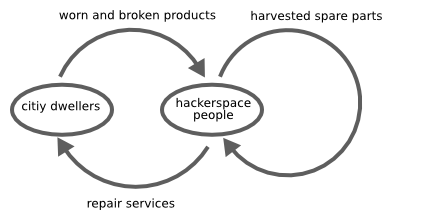Thank you @CommonFutures for alerting us about an interesting opportunity for people running Circular Economy initiatives.
- Applicant guidance: Important information about funding rules, project costs and how to submit your application
- Competition brief
- Register for 9 March Webinar
"Innovate UK is to invest up to £800k in feasibility studies into the business case for retaining value in durable goods through reuse, remanufacture or leasing/maintenance.
We are seeking projects that explore commercial models for a circular economy of goods in which resources are kept in productive use for longer following primary production – ideally at the same value/use. Projects will be expected to design a pilot to demonstrate how the model could become part of normal business.
Feasibility studies (mainly pre-industrial research projects) must be collaborative and business-led. Projects are open to companies of any size. Consortia should include a business that has a relationship with the final customer and can enable the return of products.
The amount of funding you can receive varies according to the type of organisation and type of research being undertaken. Funding levels for feasibility study research will change for competitions opening from 1 January 2015. For further information please refer to http://interact.innovateuk.org/funding-rules
We expect projects to last 6 months and to range in size from total costs of £25k to £50k.
This competition opens on 2 March 2015. The deadline for registration is at noon on 8 April 2015, and the deadline for applications is at noon on 15 April 2015. A briefing day for potential applicants will be held at the Resource Event in London on 3 March 2015. A webinar detailing the competition scope and application process will be broadcast on 9 March 2015. "
For more information visit the Innovation UK website.
